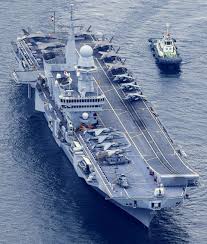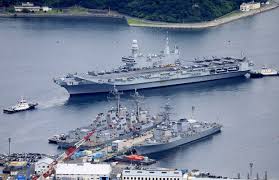A new era opens as Italy’s aircraft carrier Cavour arrives in Japan

Rome: Upon arriving in Japan last week, with Defence Minister Guido Crosetto in attendance, this deployment underscores Italy’s growing strategic focus on the Indo-Pacific region.
The stop at the Yokosuka naval base signals a pivotal moment in strengthening the defence and military ties between Italy and Japan, both of which are increasingly enhancing their strategic cooperation as the two countries work together, along with the United Kingdom, on the Global Combat Air Programme (GCAP), a sixth-generation fighter jet initiative.
The Italian Ambassador to Japan, Gianluigi Benedetti, spoke about a “new era” in bilateral relations. The strengthening of these relations includes diplomatic, defence, economic and industrial, scientific and technological, and cultural sectors, the diplomat said at the opening ceremony of the Italian Village, which was set up for the Amerigo Vespucci World Tour that will last for two years.

The attention to the F-35. In an interview with The Japan Times, Minister Crosetto highlighted that this partnership is already producing tangible results. He mentioned that joint exercises are preparing the Italian and Japanese forces to function as a cohesive unit if necessary, which enhances the security of all countries involved.
Commander of the Italian carrier strike group and the Italian Navy’s air arm, Italian Admiral Giancarlo Ciappina, emphasised the interoperability between the Italian and Japanese navies and pointed out the structural similarities between the Cavour and Japan’s Izumo-class vessels.
He also mentioned that the aircraft carrier will host Japanese naval and air force officials for knowledge transfer purposes, specifically for Short Takeoff and Vertical Landing (STOVL) operations and the deployment of F-35B aircraft.
The GCAP. Minister Crosetto spoke about the transformative potential of the GCAP project, which he described as “revolutionary.” He reassured that the program is still on schedule and stressed the critical importance of having the aircraft operational by 2035 in Tokyo.
However, the partnership extends beyond just the GCAP. Crosetto added, “In the future, I envision cooperation across all domains – land, underwater, cyber, and space.”
He also highlighted the need for collaboration to ensure the resilience of supply chains, especially with China’s dominance in rare earth materials being a significant concern.
The grand strategy. Italy’s increasing naval presence in the Indo-Pacific and Minister Crosetto’s visit to Japan signify more than a deepening of bilateral relations. The geopolitical implications also have a domestic impact, reinforcing Italy’s strategic posture on the global stage.
By promoting international cooperation and safeguarding the country’s strategic interests, the government is working to elevate Italy’s global standing and strengthen its influence within the complex political landscape of Italian governance.
As noted by Japanese Deputy Defence Minister Shingo Miyake, this collaboration will not only improve bilateral naval relations but also contribute to regional and global peace and stability, particularly in promoting a free and open Indo-Pacific.





